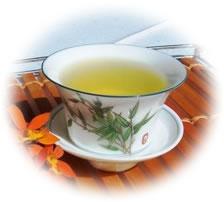Tea and caffeine
- Print ,
The determinants of the caffeine level in a tea
 Many tea drinkers are interested in the caffeine levels in various teas. The caffeine level of a tea is determined by the following factors:
Many tea drinkers are interested in the caffeine levels in various teas. The caffeine level of a tea is determined by the following factors:
- The tea plant species, various tea plants can have various levels of caffeine
- The tea leaves: young tea (green tea, white tea and some black tea) leaves tend to have higher level of caffeine than the mature leaves (Oolong teas and some black tea)
- Level of fermentation: the fermented teas (black tea and Oolong tea) tend to have higher level of caffeine than the unfermented teas (green tea and white tea)
- The tea baking time: the longer a tea is baked, the more the caffeine is evaporated (some Wuyi Oolong and some black tea)
- Matcha has the highest level of caffeine, as the entire leaves are consumed instead of the tea brew only
- The longer a tea is brewed, the more caffeine is resolved in the water
The caffeine levels of various teas:
Following are the average caffeine levels of various teas in comparison to equivalent amount (1 cup) of coffee:
- Coffee: 80mg(range from 40-170mg)
- Black tea: 40mg(range from 25-110mg)
- Oolong tea: 30mg(range from 12-55mg)
- White tea: 6-55mg
- Green tea: 20mg(range from 8-30mg)
- Pu-erh tea: 2mg (very low)
(https://goodluck2u.pixnet.net/blog/post/36239214)
Thumb of rule
It is generally believed a normal cup of tea contains about one quarter of the caffeine contained in the equivalent volume of drip coffee.
It is also recommended to consume teas in such a sequence based on the caffeine level of feasible:
- Morning - black tea
- After lunch - green tea or white tea
- After dinner - Pu-erh tea
How to reduce caffeine level if needed
Since caffeine infuses early, there is a procedure available for those wishing to minimise their caffeine intake:
- Rinse the tea leaves with hot water
- Dispose this liquid which contains the most of the caffeine
- Brew the remaining tea leaves ( 0.5-1 minutes before drinking).
Some relevant articles:
Caffeine: http://www.abc.net.au/health/library/stories/2006/04/27/1829125.htm


